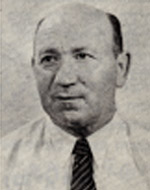Spector, Meir
Son of Gedalyahu. He was born in Russia in 1893. He immigrated to Israel in 1910 and immediately joined the Hashomer family in Hadera and during the first year of his stay there he suffered a fever and was then transferred to the Galilee, where he continued to guard the Sea of Galilee and Tel Adashim. During the First World War he went to Damascus on a Hashomer mission and in the uniform of a Turkish officer he visited the Jewish prisoners who were sent there by Jamal Pasha in order to ease their suffering and deal with their problems. He moved to Kfar Giladi for eight years and purchased weapons for the Haganah for eight years. At the outbreak of the 1929 riots he headed the Haganah group in Tel Mond and was a member of the security committee of the northern and southern Sharon Bloc. In 1936 he joined the Jewish Settlement Police Department on behalf of the Jewish Agency and in this role of their recruitment, training and work he served as the agency’s representative over an area that extended from Hadera to the Negev settlements (except for Jerusalem) until February 1948. At that time, He participated in the battles and held various positions and even attained the rank of lieutenant colonel, and in the last three years of his life he served as the head of the military court for traffic criminals, and since his arrival in Israel he was loyal to ideals of pioneering and work. They respected him for being a man in the full sense of the word, and he was intrigued by the logic that was his habit, because of cold His illness suddenly came to him, and a supreme medical committee of the Israel Defense Forces determined that it would be possible for him to undergo medical surgery abroad. He was flown to the United States by order of the Chief of Staff, but on March 15, 1955, he died at the hospital in New York (Memorial Hospital), and a week later his coffin was brought to rest. In the “Hashomer” graveyard in Kfar Giladi he laid down a wife and two sons, and notes and excerpts from his memoirs appeared in three books about Hashomer: one published by the Labor Archives, the other by Dvir, and the third by the Jewish National Fund To Israel
